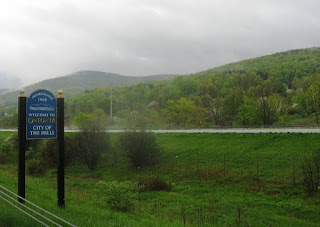Although generations of geographers (myself included) have studied “sense of place”—scrutinized, surveyed, and theorized; coined new terms and debated old ones; written papers and books and dissertations—anyone alive in the place-world (thus, everyone) intuitively recognizes: the more time a person spends in a place, the more we fill that place with memories and meanings. A simple matter of opportunity and exposure. More moments = more memories. More memories = more meaning.
Memory-full and meaning-full does not, however, mean
memorable much less meaningful. Sense of place does not automatically translate to place-attachment, an affinity for a place.
After living in a small city in Upstate New York for nearly nine years, I have left. I am not sorry to go.
I walked a lot. Some 30,000 miles, I estimate, through
several pairs of shoes. That’s how I get to know a place. Memories, meanings, step by step.
I remember walking up the hill to the college where I
worked. Not a steep hill, but enough to get the blood flowing 6 a.m.-ish. Peaceful
in the pre-dawn darkness: past sleeping houses, a dark patch of woods, a starry open stretch onto campus, just me and the deer and a steady line of cars. Relaxing in reverse, near or post-sunset: more people on the sidewalks, more traffic on the streets. Sheltered enough during rainstorms, pleasantly cool in late summer; less enjoyable in winter, when I came to anticipate
which sidewalks would be shoveled and which would be knee-deep in snow or slippery-smooth with ice. I must have walked up and
down that hill 700 or 800 times. It was a nice enough commute, but I will not miss it.
I remember the long loop around—a full eight miles up and
down hills, past hops fields, hayfields, horse pastures, trees, trees, trees. In
some spots, a view out across the entire valley; in others, tight ribbons of water
tumbling through steep streams. I came to know where to look for the first
trout lilies and where to keep an eye out for porcupines; where there are apple
trees in autumn and maples tapped in spring. Where drivers tend to be
distracted and cut corners. When the school bus drivers honk and wave
hello. That route, I probably only walked a few hundred times. I will not miss
it.
Then there’s the stretch of road leading west of town, along the river valley, between the highway and the railroad tracks, river itself inaccessible. Finally, free from trees, houses, sidewalks, with an open view of wetlands, hills, sky. (Electric wires, buildings, traffic.) That, I must have walked at least a thousand times, each direction. I walked through white-outs and thunderstorms, past herons and eagles, a hundred red-winged blackbirds and a million peepers singing to the spring. Hawks on electric poles, beavers and turtles not quite dodging traffic. Near-daily photos of cloudscapes. I will not miss it.
Better yet, the town is full of trails. Well-maintained and
well-used, yet never overrun by hordes of hikers or mountain bikers. I got lost
dozens of times in the tangle of routes in the woods behind the college, spent Sundays looping the flats down by the river, and, most importantly, found
solace in the network directly behind my house. Clad in sandals in summer or
snowshoes in winter, I could step out my door, up into the woods, and wind
around for hours. Alongside a pine-studded ravine running with waterfalls or
icefalls, speckled bright in the morning sun. Past series of stone fences, laboriously
constructed, now fading into moss and fallen leaves. Through birch groves
and brush glowing green in summer, grey-white in winter, and color upon color upon color in autumn. I couldn’t possibly count how many times I paced those
trails, or simply went up into the woods and found a spot to sit. Unlike the walks to campus
or around town, those weren’t part of a daily routine—that space was my refuge,
where I went when I needed to think or unthink, the only area I might
possibly have missed.
It was all wrong. For nearly nine years, I kept rationalizing, reasoning, trying to figure out why I couldn’t appreciate the landscape and community the way anyone ought to be able to. It’s such a nice town, such kind people, such a pretty place. But, through all of my walking and thinking, my moments and memory-making, I knew: not my place, not my place, not my place.
And that's okay?
















2 comments:
Hi Tyra! I liked this post.
Why have you left this small town? New opportunity?
Where are you going? Do you think it will have similar trails and places of nature?
Hello! Thank you!
Although it's a lovely place, this small town just wasn't my place. I tried, for years and years, to fit in, but yes, when a new opportunity arose to try a new place, I took it. It's full of even more trails, even more wildness. (Best of all, thousands and tens of thousands of acres without trails or roads or sidewalks, all nature.)
Onward.
Post a Comment